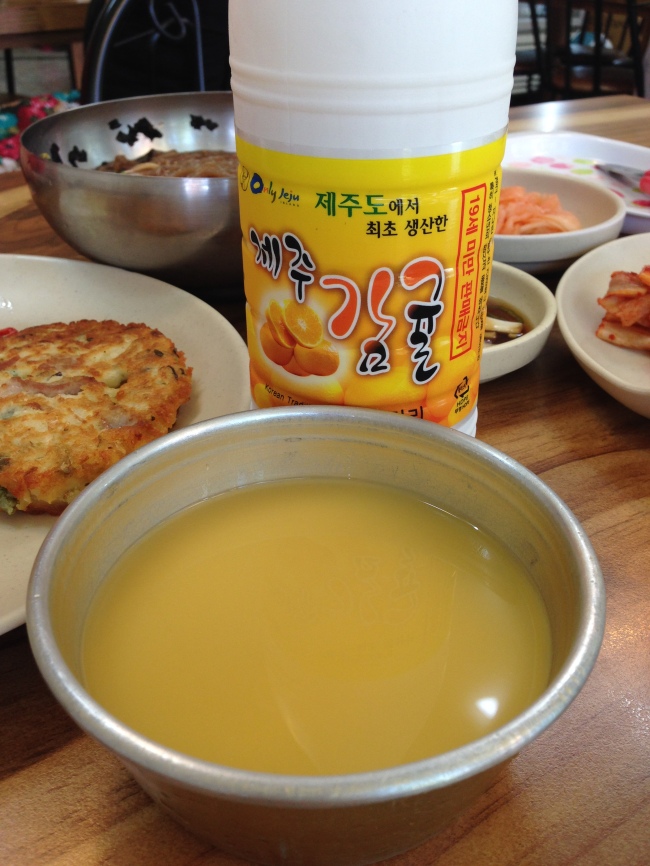Nature makes Jeju delicacies one of the best in Korea
By Lee Woo-youngPublished : Oct. 30, 2013 - 20:58
Jeju Island is known for the abundance of rocks, women and wind, earning it the moniker “Samdado Island,” for having plenty of the “three features.” But another feature to add is its food.
The island, surrounded by the sea with Hallasan Mountain in the center and vast stretches of fields growing vegetables, boasts a wide variety of natural produce.
However, seafood dishes are not to be missed on Jeju Island. And if one faces a difficult decision of what to choose among hundreds of seafood specialties that local restaurants offer, one is recommended to have a spicy assorted seafood stew, called “haemultang” in Korean.
The island, surrounded by the sea with Hallasan Mountain in the center and vast stretches of fields growing vegetables, boasts a wide variety of natural produce.
However, seafood dishes are not to be missed on Jeju Island. And if one faces a difficult decision of what to choose among hundreds of seafood specialties that local restaurants offer, one is recommended to have a spicy assorted seafood stew, called “haemultang” in Korean.

The big hot stew contains popular local seafood harvests including small blue abalone, or obunjagi, hard shell shrimp, crabs, octopus, fish and more. The main difference from seafood stews from other regions is that you don’t run out of seafood until you see the bottom of the pot. It’s usually priced around 30,000 won ($38) to 50,000 won for a minimum three-person serving at most seafood stew restaurants on Jeju Island.
Another delicacy is the spicy braised hairtail seasoned with hot, spicy and sweet sauce.
The hairtail fish, which used to be abundant around the waters off Jeju Island, has seen a decrease in its catch, and has been elevated from part of the daily menu to a special occasion dish for Jeju residents. The medium-size pot usually has more than six pieces of hairtail fish that satisfy the palette and fill the stomach. The price for a two-person serving ranges from 20,000 won to 40,000 won.
Each province in Korea produces and sells its own homegrown alcohol, and Jeju Island is no exception. Two popular local drinks are Hallasan Soju and Jeju Makgeolli. The Hallasan Soju recently proved its popularity as it began exporting to China thanks to the increasing Chinese fans who tasted it while traveling in Jeju.
Jeju Makgeolli boasts a unique flavor as it is made with local specialties such as tangerine, barley and millet. The tangerine makgeoli pairs well with jeon, or Korean pancakes, as it adds a citrus flavor to the heavy, greasy taste of the pancakes.
Another delicacy is the spicy braised hairtail seasoned with hot, spicy and sweet sauce.
The hairtail fish, which used to be abundant around the waters off Jeju Island, has seen a decrease in its catch, and has been elevated from part of the daily menu to a special occasion dish for Jeju residents. The medium-size pot usually has more than six pieces of hairtail fish that satisfy the palette and fill the stomach. The price for a two-person serving ranges from 20,000 won to 40,000 won.
Each province in Korea produces and sells its own homegrown alcohol, and Jeju Island is no exception. Two popular local drinks are Hallasan Soju and Jeju Makgeolli. The Hallasan Soju recently proved its popularity as it began exporting to China thanks to the increasing Chinese fans who tasted it while traveling in Jeju.
Jeju Makgeolli boasts a unique flavor as it is made with local specialties such as tangerine, barley and millet. The tangerine makgeoli pairs well with jeon, or Korean pancakes, as it adds a citrus flavor to the heavy, greasy taste of the pancakes.

By Lee Woo-young (wylee@heraldcorp.com)









![[Hello India] Hyundai Motor vows to boost 'clean mobility' in India](http://res.heraldm.com/phpwas/restmb_idxmake.php?idx=644&simg=/content/image/2024/04/25/20240425050672_0.jpg&u=)








